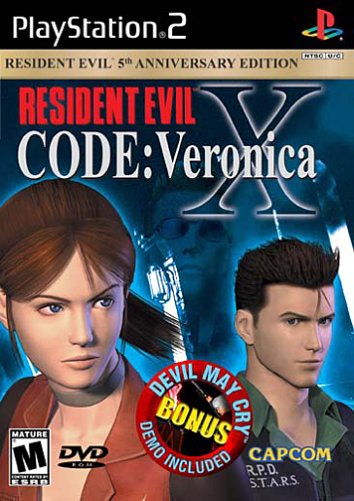
 |
 |
 |
 |
 |
 |
 |
|---|

|
|---|
At the time of its release, the best of the Resident Evil series.
+
The artistic ambiance of the game is just as absorbing as the other three, with the same thrilling shock-filled moments of tension that made the series what it is today. The story, like the other three, also has a kind of "beware of biogenetic engineering" theme, showing the player how it can be used for evil.
The story picks of where the second one left off - it unviels the strange, complex situation behind the Umbrella Corporation, and does it in a way that is somewhat intriguing. The guy in black that moves around like The Matrix is cool, and with his background the story appears to be much deeper than just the insane Ashfords and the T-Virus.
The story also features a guy who can't trust anyone because of his father, and, through the course of the game, is able to trust Claire. The Steve turns into a zombie, but can't kill Claire because his love is too strong. There are many plot twists.
The combination of zombie-shooting, puzzle-solving, and item-collecting still makes the game just as enjoyable as the other three, only this time around it is more perfected.
-
The emotional struggle Steve had with his father seemed phony. There was no emotional buildup. I did not understand the deep, emotional reasons behind his sadness. It's as if the drama was just stapled in there. It reminds me of Pearl Harbor.
Most of the game you do everything all alone. Then at the end when Claire and Steve start flirting, it seems phony because they didn't interact with each other enough. Many of the emotionally riviting moments seem empty and phony because there was no build-up.
The camera-obscuring-zombies problem still hasn't been fixed.
The limited inventory is annoying. Unlimited capacity is the only way to go.
The whole ink ribbon idea for saving your game never made sense, and it still doesn't. Not only that, but it is one extra thing to keep track of in your limited-space inventory.
The game had three things that got really annoying. (1) The camera obscuring view much of the time and (2) the limited-space inventory. Because of the limited space in the inventory, often times I would get to a point where I realize "Oh gee, this would work if I had that one item with me", and then I would have to travel all the way back to the storage box to get it. This is unnecessary busy work. (3) Many of the enemies have been given the ability to whack you with almost no way to dodge. Dodging also becomes more frustrating when the camera angles screw it up.
You run around, finding piano reels in torchure rooms, and other trinklets in hidden places, but it never expains why Ashley designed his estate to be so much like a hidden treasure fun house, with ruby ants that lead to hidden rooms when placed on music boxes and so on. There should have been an explanation somewhere in the plot.
The artistic ambiance of the game is exactly the same as the previous three. The gameplay is also the same - point and shoot zombies, examine written documents, eat herbs, get startled by zombies crashing through windows, and so on. This adds nothing new to the series. As I play, I feel like I've done this before. Three times before, in fact.
Some of the bosses virtually require you to have a certain number of certain types of items in your inventory to win. If the player gets to a boss without the proper equipment, then she will have to start over.
Chris Redfield wasn't introduced as a character in the story until over half-way through the game.
Steve and Chris had Canadian accents.